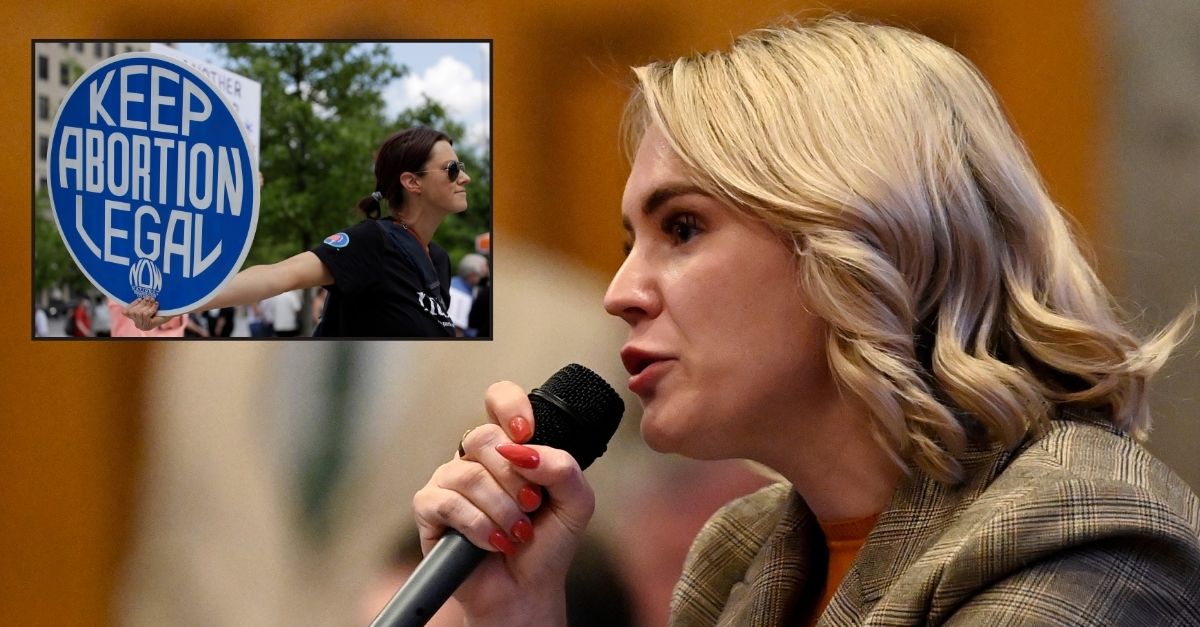
Main: FILE – Rep. Aftyn Behn, D-Nashville, talks on a bill brought to the House floor April 15, 2024, in Nashville, Tenn. (AP Photo/Mark Zaleski, File). Inset: FILE – An abortion-rights demonstrator holds a sign during a rally, May 14, 2022, in Chattanooga, Tenn. (AP Photo/Ben Margot, File).
A federal judge on Friday temporarily blocked Tennessee’s so-called “abortion trafficking law,” which bans adults from helping minors get an abortion without parental permission.
Tenn. Code Ann. § 39-15-220 was passed by the Tennessee General Assembly on April 24 and signed by Gov. Bill Lee on May 28. It went into effect on July 1. It imposes both civil and criminal liability, and does not contain exceptions for cases in which a minor may have been raped by a parent or guardian.
Tennessee’s statute prohibits “intentionally recruit[ing], harbor[ing], or transport[ing] a pregnant unemancipated minor within this state” for the purpose of concealing an illegal abortion from parents or guardians “regardless of where the abortion is to be procured,” or obtaining an abortion-inducing drug for a pregnant minor “regardless of where the abortion-inducing drug is obtained.”
The Tennessee law mimicked a similar first-of-its-kind statute enacted in Idaho last year. Like Tennessee’s law, Idaho’s statute was also temporarily blocked by a federal judge as an unconstitutional restriction on free speech and as unconstitutionally vague.
Two abortion rights activists, attorney Rachel Welty and Tennessee Rep. Aftyn Behn, who is also a social worker, sued to challenge the law. The plaintiffs were represented by attorneys Daniel Horwitz, Sarah Martin, and Melissa Dix. The State of Tennessee moved to dismiss the complaint.
In a 49-page ruling, U.S. District Judge Aleta Trauger granted a preliminary injunction in favor of the plaintiffs, blocking the law’s enforcement, and denied Tennessee’s motion to dismiss the lawsuit. The decision means that the law will be put on hold as the case makes it way through the court system.
Trauger, a Bill Clinton appointee, said in her ruling that if Tennessee had chosen to limit its prohibition to illegal abortions performed within state borders, then the law would likely have been considered within the tradition of prohibition of speech facilitating unlawful acts.
“The Tennessee General Assembly, however, chose to take the extraordinary step of attempting to outlaw any “recruit[ment] … [of] a pregnant unemancipated minor within this state for the purpose of … [p]rocuring an act that would constitute a criminal abortion [in Tennessee] for the pregnant unemancipated minor, regardless of where the abortion is to be procured,” Trauger wrote. “Tennessee, in other words, has chosen to outlaw certain communications made in the furtherance of abortions that are, in fact, entirely legal.”
Trauger also had blunt words for the Tennessee legislature.
“It is, therefore, a basic constitutional fact — which Tennessee has no choice but to accept — that, as long as there are states in which abortion is permissible, then abortion will be potentially available to Tennesseans,” she wrote.
The judge found that it was unlikely the statute would survive strict scrutiny, noting that “Tennessee has no legitimate interest — let alone a compelling interest — in regulating medical care rendered outside the state’s borders.”
Further, Trauger remarked, Tennessee’s statute suffers from practical problems of interpretation and enforcement. She pointed out that even those closest to the law appear unclear about the statute’s limitations.
“No one associated with Chapter 1032 seems to have a particularly clear picture of what the provision is supposed to prohibit — not the prosecutors who will be called on to enforce it; not the state attorneys called on to defend the statute in court; and, it seems, not even the individuals who drafted the provision itself,” the judge noted.
“Whatever it means to ‘recruit’ a person to receive a lawful abortion, however, such recruitment would inherently involve First Amendment-protected speech,” Trauger also said.
In her ruling, Trauger recalled what attorneys for Tennessee argued during the hearing she conducted on the matter. Trauger said the legal arguments failed to distinguish between a person who broke the law banning “recruiting” and one who took additional steps of coercion or other wrongdoing.
Trauger reminded that during the hearing, she “pressed the matter further, pointing out that it was not asking about the construction of the statute, but the policies and intentions of the defendants,” and said that she specifically asked Tennessee’s lawyers why they couldn’t do a filing that specifically promises how the Tennessee District Attorneys would limit their prosecutions.
“Counsel responded that, ‘if the Court is asking us to make that filing with an affidavit from the defendants, then we can certainly consider that,'” but remarked that, “No such filing has been made.”
Behn praised the ruling as a “monumental victory for free speech and the fight for abortion rights.”
“This ruling doesn’t just protect Tennesseans — it safeguards the freedom to discuss abortion care across state lines, ensuring that we can continue to offer support, share accurate information, and stand up for the rights of those seeking essential health care everywhere,” Behn said in a statement Friday.
Likewise, Welty said, “As an attorney, this victory is a powerful affirmation of our right to provide clear and confident counsel on abortion care.”
“This law directly attacked the attorney-client relationship, threatening the ability to offer trusted legal advice without fear of prosecution,” Welty continued. “Today’s ruling not only protects that essential relationship here in Tennessee but also safeguards the freedom of speech for attorneys across the country to discuss abortion care openly and honestly. This is a critical win for all of us working to support those seeking reproductive healthcare, and it ensures that we can continue to advocate for our clients without state interference.”
The case is next scheduled in court on Nov. 18.
You can read the full ruling here.
Editor’s note: This piece was updated from its original version to include the names of plaintiffs’ counsel.
The post Judge blocks ‘abortion trafficking’ law, slams Tennessee legislature for having ‘no legitimate interest’ in medical care outside state borders first appeared on Law & Crime.















 English (US)
English (US)